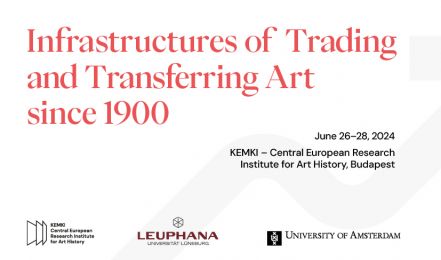‘mail art’
A jövő archívumai
Digital selection from the Poetry Bureau (Andrzej Partum) and Artpool collections. "Artists are like seismographs foreseeing future tectonic movements. In the same decade, the 1970s, unusual institutions were established both in Budapest and Warsaw: Artpool by György Galántai and Júlia Klaniczay, and Andrzej Partum’s Poetry Bureau. It was clear to everyone that something extraordinary was happening. Even if only because any disobedience invited …
ARTMargins Print, Resonances különszám
… of conference papers from KEMKI’s Resonances project is published in the latest issues of ARTMargins Print by MIT Press. The special issue includes articles by Emese Kürti, Cristian Nae, and Małgorzata Miśniakiewicz. Emese Kürti, “Minorities as Hubs of Cultural Transfer: The Bosch+Bosch Group” Małgorzata Miśniakiewicz, “Socialization of the Private? The Emergence of Polish Mail Art and the Ideas of Democratic Opposition” Cristian Nae, “Constellational …
CFP: Infrastructures of Trading and Transferring Art since 1900
Workshop - Call for Papers Although art market studies as an academic field has become increasingly popular in the last decade, there has been little research that critically examines the actors, places, rules, and structures of this system. This workshop aims to explore the infrastructures through which artworks have been produced and exchanged for goods, money, services, and reputation since 1900. Our focus is not only on the …
Tót Endre: Documents Make Me Glad/Sad/Mad
The relationship between Endre Tót and Artpool dates back many decades. The most obvious contemporary monument of this relationship is the "sidewalk table" with the line: I am glad to have stood here in front of the Artpool entrance but the archive preserves works and documents of the artist from all eras. On the occasion of the TÓTalJOY award, we have selected more intimate pieces and documents, which reveal the friendship and …
Fanzin-anatómia – zenei és politikai témájú magyar alternatív kiadványok az Artpool gyűjteményéből
… inexpensive publications emerged that (unlike samizdat) were themed around (and for) a particular subculture, scene or fan community. In the 1990s, liberation of social organizing, together with the growing availability of photocopying and Western models, created the ideal conditions for the flourishing of fanzines as a genre. This intense period seems to have come to an end in the 2000s with the rise of the internet. Subcultural discourse has largely moved online and zines …




